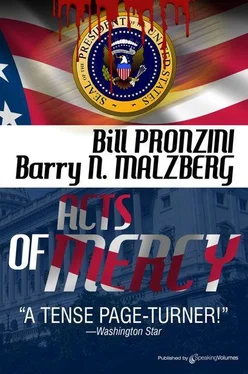Bill Pronzini - Acts of Mercy
Здесь есть возможность читать онлайн «Bill Pronzini - Acts of Mercy» весь текст электронной книги совершенно бесплатно (целиком полную версию без сокращений). В некоторых случаях можно слушать аудио, скачать через торрент в формате fb2 и присутствует краткое содержание. Жанр: Триллер, на английском языке. Описание произведения, (предисловие) а так же отзывы посетителей доступны на портале библиотеки ЛибКат.
- Название:Acts of Mercy
- Автор:
- Жанр:
- Год:неизвестен
- ISBN:нет данных
- Рейтинг книги:4 / 5. Голосов: 1
-
Избранное:Добавить в избранное
- Отзывы:
-
Ваша оценка:
- 80
- 1
- 2
- 3
- 4
- 5
Acts of Mercy: краткое содержание, описание и аннотация
Предлагаем к чтению аннотацию, описание, краткое содержание или предисловие (зависит от того, что написал сам автор книги «Acts of Mercy»). Если вы не нашли необходимую информацию о книге — напишите в комментариях, мы постараемся отыскать её.
Acts of Mercy — читать онлайн бесплатно полную книгу (весь текст) целиком
Ниже представлен текст книги, разбитый по страницам. Система сохранения места последней прочитанной страницы, позволяет с удобством читать онлайн бесплатно книгу «Acts of Mercy», без необходимости каждый раз заново искать на чём Вы остановились. Поставьте закладку, и сможете в любой момент перейти на страницу, на которой закончили чтение.
Интервал:
Закладка:
But he had not had time to dwell on the news. At onefifteen there had been a brief meeting with a ceremonial delegation from the National Council of Ministers, who were in town for their annual convention; the bishop said he would pray for the presidency. At one forty-five there had been a conference with Senate Majority Leader Gordon Parkson on S-1, a dangerous bill authored several years before by Nixon (no sympathy this time) and John Mitchell which would severely repress civil liberties and which was now out of committee after nearly two years and would be put on the Senate floor for debate. Parkson had had no constructive ideas on how to get it back into committee or to otherwise block it.
At two-thirty Vice-President Jim Conroy had telephoned from Phoenix. Conroy had been making a week-long swing through several Western states, doing a little preconvention stumping, but had been having a fairly rough time of it: in Montana he had had to be hurriedly taken away from his hotel to escape an unruly crowd gathered to demonstrate in favor of a Cheyenne Indian takeover of their reservations; and in Wyoming he had suffered a mild case of food poisoning at a banquet which he was convinced had not been accidental. He said there was radical unrest in Arizona, too, and wanted to know if he could cut the trip short and come straight back to Washington. Augustine told him no, repressing the urge to tell him flat out that he was not only a whiner but a coward.
No sooner had he broken the connection than Oberdorfer had telephoned from Tel Aviv to discuss the “Israeli crisis.” Which turned out to mean that Prime Minister Stein was angry and demanding an immediate public retraction, and unless he got it was intimating that the Augustine administration would face the loss of financial and political support from the American Jewish community. Oberdorfer said ominously that careful consideration must be given to Stein’s demand “or I will not be held responsible for the consequences”; Augustine said he would be in touch shortly on the matter and then hung up on him, the bastard.
Now it was after three, and he had a half-hour open before another meeting with Hendricks and Wade and Sandcrane on the damned Indian problem, and what he planned to do was to lie down on the Oval Office couch, just lie down and rest for thirty minutes. So, naturally, George Radebaugh buzzed him from the outer office and said that the attorney general wanted to see him on a matter of considerable urgency.
Christ, Augustine thought, now what? He picked up one of his pipes, tapped the bit wearily against his teeth. “All right,” he said, “send him in.”
Wexford entered immediately, and the first thing Augustine noticed about him was that he looked nervous and haggard. There was a thin coating of perspiration on his florid face that gave it a polished sheen, like a block of old carved wood. As he approached, his eyes drifted from side to side, never quite meeting Augustine’s.
“Thank you for seeing me, Nicholas,” he said, and sat stiffly in one of the facing chairs.
“What’s the problem?”
Wexford seemed reluctant to speak. He took a handkerchief from his breast pocket and patted at his damp cheeks; he cleared his throat, seemed to find something to stare at on the terrace beyond the French doors. Intuition touched Augustine, tightened his mouth and narrowed his eyes; he was remembering what Maxwell had said to him this morning and what Justice had told him at noon. But he did not say anything, watching Julius, waiting for him to get on with it.
“Nicholas,” Wexford said finally, and then stopped and cleared his throat again. “Nicholas, I’ve been taking soundings on this Israeli thing and I just received advance word on the new Harris poll from Austin. It looks like a twenty-two percent approval rating. Now I don’t have to tell you how serious that is-”
“Get to the point, Julius,” Augustine said. “You didn’t come to tell me about the Harris poll.”
Wexford seemed to draw himself up. “No, you’re right,” he said, “I didn’t. I might as well be direct; the situation is painful enough without beating around the bush. The fact of the matter is, there was a rump meeting of the National Committee in Saint Louis last night, and I’m flying out there again this evening for the formal procedural discussions on the convention, and… well, there’s been a considerable amount of sentiment that it might be best for everyone-the nation, the party, even yourself-If you would decide not to seek renomination.”
“I see.” Carefully, Augustine laid his pipe on the desk, put his hands flat on the litter of papers before him. There was anger in him, but it was cold, controlled. He had known for weeks that something like this might happen, although he had deluded himself into believing that it would not. “And am I to believe this sentiment is based on a twenty-two percent preliminary Harris? Or is there more to it than that?”
Wexford still refused to meet his eyes. “There is no single causative factor; it’s a whole pattern of feeling which has developed over recent months. And you know what’s been happening in the primaries, Nicholas.”
Nothing much had been happening in the primaries. Kineen had won all but one of them-the favorite-son candidate had beaten him in Pennsylvania-but he had done so over a widely split field of test-case candidates. The primaries meant little against an incumbent president anyway; even LBJ, who had lost in New Hampshire and Wisconsin in 1968, could not have been denied renomination on their basis. What primaries were, in truth, was shadow plays: clever little exercises exactly as important as the National Committee cared to make them. You could build a nomination on a series of victories, yes, as Jimmy Carter had done, as he himself had done to a lesser degree four years ago; but there were subtle ways to make sure that no victories came to a candidate the committee did not really want, and subtle ways of making even victories seem inconsequential.
Augustine said, “Either you share this sentiment, Julius, or you’re the one who got the ball rolling in the first place. Which is it?”
“I share it, that’s all.”
“Then who did get the ball rolling? Briggs, maybe?”
“No,” Wexford said, but his eyes flicked even further aside as he said it: Briggs had been a major factor, all right. “No one got the ball rolling, Nicholas. It was simply a consensus feeling on the part of the National Committee.”
“Who else in the administration goes along with it?”
“Quite a few people,” Wexford said. “I’m sorry, I dislike having to do this, but-”
“But you’re still doing it, aren’t you? Did you volunteer to be the hatchet man, or did they give you the job because no one else wanted it?”
“It was felt that because of our long-standing friendship-”
“Friendship? You’re a goddamn Judas.”
Wexford looked pained. “Please, Nicholas. It’s not that we feel you haven’t done a good job. It’s just that the time has come for a change if the party is going to remain strong and unified. You must understand that.”
“I understand nothing of the sort.”
“It would be an unselfish and magnanimous act-”
“You’re presupposing that I might be pressured into going along with the idea,” Augustine said in a deceptively soft voice. “But what if I refuse? What if I decide to take my case to the people?”
A look of shock spread across Wexford’s face; he was such a party politician, Augustine thought, that it was difficult for him to conceive of anyone bucking the National Committee, even the President himself. “You wouldn’t do that,” he said.
“Wouldn’t I? I still have a few friends left.”
“Yes, but not enough. My God, you’d tear the party apart.”
Читать дальшеИнтервал:
Закладка:
Похожие книги на «Acts of Mercy»
Представляем Вашему вниманию похожие книги на «Acts of Mercy» списком для выбора. Мы отобрали схожую по названию и смыслу литературу в надежде предоставить читателям больше вариантов отыскать новые, интересные, ещё непрочитанные произведения.
Обсуждение, отзывы о книге «Acts of Mercy» и просто собственные мнения читателей. Оставьте ваши комментарии, напишите, что Вы думаете о произведении, его смысле или главных героях. Укажите что конкретно понравилось, а что нет, и почему Вы так считаете.












